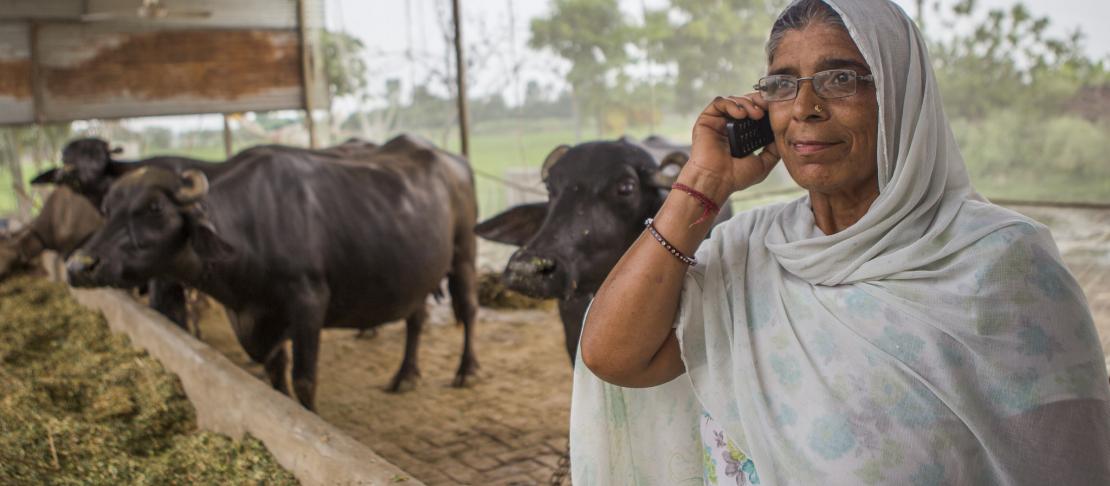
The inclusion of gender analysis and the collection of sex-disaggregated data in agriculture research can improve food security and increase productivity and incomes.
This list includes a selection of CCAFS publication with sex-disaggregated data on climate-smart agriculture in South Asia.
Click here for publications from other regions.
South Asia
Click on the name of a country above to jump to that section.
BANGLADESH
| Participatory gender-sensitive approaches for addressing key climate change-related research issues: Evidence from Bangladesh, Ghana, and Uganda |
|
| Understanding Adaptive Capacity: Sustainable Livelihoods and Food Security in Coastal Bangladesh |
|
| Global summary of baseline household survey results |
|
| Participatory Action Research on Climate Risk Management, Bangladesh |
|
| CCAFS Baseline Survey Indicators for Bagerhat/Morrelganj, Bangladesh |
|
| A framework to understand gender and structural vulnerability to climate change in the Ganges River Basin: lessons from Bangladesh, India and Nepal |
|
| Connecting women, connecting men: How communities and organizations interact to strengthen adaptive capacity and food security in the face of climate change |
|
| Microinsurance Decisions: Gendered Evidence from Rural Bangladesh |
|
| Understanding gender dimensions of agriculture and climate change in smallholder farming communities |
|
INDIA
| Gender Dimensions on Farmers’ Preferences for Direct-Seeded Rice with Drum Seeder in India |
|
| Assessment of India’s integrated agrometeorological advisory service from a farmer perspective |
|
| Global summary of baseline household survey results |
|
| CCAFS Baseline Survey Indicators for Haryana/Karnal, India |
|
| CCAFS Baseline Survey Indicators for Bihar/Vaishali, India |
|
| Summary of baseline household survey results: Karnal, Harayana State, India |
|
| A framework to understand gender and structural vulnerability to climate change in the Ganges River Basin: lessons from Bangladesh, India and Nepal |
|
| Connecting women, connecting men: How communities and organizations interact to strengthen adaptive capacity and food security in the face of climate change |
|
| Role of mobile phone-enabled climate information services in gender-inclusive agriculture |
|
| Climate change, gender and adaptation strategies in dryland systems of South Asia: a household level analysis in Andhra Pradesh, Karnataka and Rajasthan states of India |
|
| The diversity of gendered adaptation strategies to climate change of Indian farmers: a feminist intersectional approach |
|
| Woman in agriculture, and climate risks: hotspots for development |
|
| Integrating Gender into the Climate-Smart Village Approach of Scaling out Adaptation Options in Agriculture |
|
| CCAFS Climate Smart Agriculture Learning Platform, South Asia, September 2017 |
|
NEPAL
| Summary of Baseline Household Survey Results: Rupandehi, Nepal |
|
| Village Baseline Study: Site Analysis Report for Rupandehi, Madhuri Village, Nepal (NE0336) |
|
| Gender roles and greenhouse gas emissions in intensified agricultural systems in the mid-hills of Nepal |
|
| Village Baseline Study: Site Analysis Report for Rupandehi, Madhuri Village, Nepal |
|
| A framework to understand gender and structural vulnerability to climate change in the Ganges River Basin: lessons from Bangladesh, India and Nepal |
|
| Connecting women, connecting men: How communities and organizations interact to strengthen adaptive capacity and food security in the face of climate change |
|
SRI LANKA
| Improving water productivity, reducing poverty and enhancing equity in mixed crop-livestock systems in the Indo-Gangetic Basin |
|
Photo: Prashanth Vishwanathan